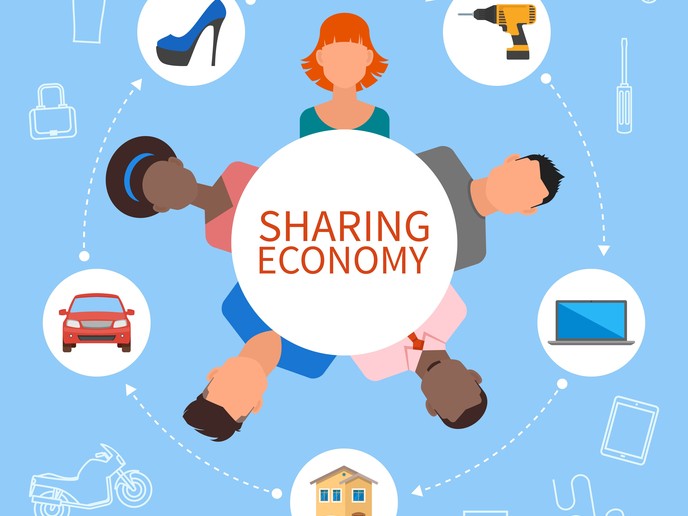
In recent years more and more applications and platforms arise that revolve around sharing. The sharing economy is based upon an obtaining, giving or sharing access to goods and services to everyone [1]. Sharing economy is also known as ‘gig economy’ and ‘platform economy’. The sharing economy is heavily technology reliant as most platforms are internet-based. Peer-to-peer interactions are necessary to provide goods or services and the success of companies or organizations who utilize this type of model are strongly affected by network effects [2]. Applications such as Uber, Airbnb and GO sharing are part of the ‘shared economy’ and they have proved to be very successful.
The above mentioned applications/companies are one of the most well known cases of the ‘shared economy’, but according to what services these platforms provide various subcategories can be made [3]:
- B2C temporal access to goods
- B2C, B2B or P2P temporal access to physical spaces
- B2C or P2P temporal access to professional on-demand services
- Redistribution platforms
- P2P access to knowledge, skills and money
B2C temporal access to goods
This first category entails business to consumer temporal access to goods, meaning that a company offers their goods for rental purposes for a certain amount of time. An example is the ‘GO Sharing’ application in the Netherlands. This application lets users (consumers) rent an electric scooter and let the user pay per km driven.
B2C, B2B or C2C temporal access to physical spaces
This second category involves business or consumers offering physical spaces for rent to consumers. An example for B2C is Stashbee in the UK. Stashbee allows consumers to rent a (shared) storage unit via the application. An example for B2B is WeWork, with enables business to rent an office space from one of WeWork’s location. Lastly, C2C allows temporary access to physical spaces, Airbnb is such a platform which allows consumers to rent an apartment/house for a certain amount of time.
B2C or C2C temporal access to professional on-demand services
This category entails offering professional on-demand services such as, fitness classes and taxi services. An example for B2C is ‘Classpass’, which is a platform that allows companies in the sports industry to offer their service such as fitness or yoga classes to consumers. An example for C2C is Uber, which we all know is rapidly growing and disrupting the taxi service industry.
Redistribution platforms
The last category are redistribution platforms, which entail that businesses or consumer can resell their goods to other businesses or consumers. An example of such as platform in the Netherlands is Marktplaats, or a more international example is eBay.
P2P access to knowledge, skills and money
P2P access to knowledge, skills and or money relates to the fact that the community can make use of each other. An example of such a platform is Kickstarter, where users can crowdfund their projects by providing information about it, in turn other users (peers) can donate money to the project and get specific rewards.
The sharing economy is a thing we can no longer ignore and more and more platforms will arise that will offer different products and services that satisfy the needs of both businessess and consumers. Do you think that in the future the sharing economy will be the norm and will replace existing businesses and services?
[1] https://www.brookings.edu/wp-content/uploads/2016/12/sharingeconomy_032017final.pdf
[2] https://www.sciencedirect.com/science/article/pii/S0959652620300512
[3] https://www.sciencedirect.com/science/article/pii/S0959652620300512

Hi Justin! First of all, thankyou for this clear explanation of the shared economy and its categories. It is very convenient to read and very understandable. I am amazed by the fact that certain technologies have made it possible that everyone can have access to certain products and services now by companies operating with a platform business model. This has significant advantages, among others a positive impact on the fight against climate change. For example, platforms like uber and felyx (shared scooters) reduce the need for owning a vehicle yourself which leads to a reduction of the production of those vehicles. On the other hand, the shared economies are disturbing the way long established traditional firms operate. The way of value creation within platforms is very different from traditional firms.
In answer to your question, I believe that the sharing economy will indeed replace a lot of traditional business models. From the most valuable companies worldwide, seven out of ten are based on a platform business model. When you look around, start-ups in the platform world are booming. The environment of the platform economy is however very competitive and a lot of times, it ends with a ‘winner takes it all’. Existing firms based on traditional business models will for sure have to adapt by for example offering a platform by themselves or becoming part of an already existing platform.